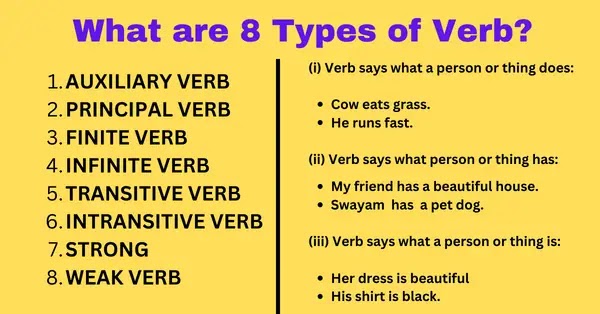TABLE OF CONTENTS
- AUXILIARY VERB
- PRINCIPAL VERB
- FINITE VERB
- INFINITE VERB
- TRANSITIVE VERB
- INTRANSITIVE VERB
- STRONG VERB
- WEAK VERB
 |
| What are 8 Types of Verb? |
Definition of Verb
A verb is a word that denotes being, having or doing something. It denotes action and possession.
(i) Verb says what a person or thing does:
- Cow eats grass.
- He runs fast.
- She speaks English.
- We love our family.
- The clock strikes 12.
- That shopkeeper always cheats me.
(ii) Verb says what person or thing has:
- My friend has a beautiful house.
- Swayam has a pet dog.
- A table has four legs.
- A car has four wheels.
(iii) Verb says what a person or thing is:
- Her dress is beautiful
- His shirt is black.
- The cat is white.
- Seema is a teacher.
- Riya is very sweet girl.
8 Types of Verb English Grammar are: 👇
- AUXILIARY VERB
- PRINCIPAL VERB
- FINITE VERB
- INFINITE VERB
- TRANSITIVE VERB
- INTRANSITIVE VERB
- STRONG
- WEAK VERB
1. AUXILIARY VERB: An Auxiliary verb is one which helps a Principal verb to form a tense or mood a voice. Hence it is also called a Helping verb. Can, could, shall, should, will, would, may, might, must, need, used(to), ought(to), be, have and do are Auxiliary Verbs.
- She is writing a letter.
- I have come to school.
- He does not go to school.
- She will sing a song.
- You must get there on time.
ii. Modal Auxiliaries: All Auxiliaries Verbs except to be, to have and to do are Modal auxiliary verb. These verbs used to express ideas like suggestions, possibility, permissions, ability, obligations, etc.
|
Primary Auxiliaries |
Modal Auxiliaries |
|
1. These Verbs change their forms according
to the number and person of the subject.
2. Examples: To be: be, is, am, are, was, were, been, being. To have: have, has, had, and having. To do: do, does, did. 3. It has infinitive or participle forms. such as 'to be promoted', 'to be gone'. |
1. These verbs do not change their forms,
whatever be the number and person of the subject.
2. Examples: Can, could, shall, should, will, would, may, might, must, need,
used(to), ought(to) 3. Do not have infinitive or participle forms. such as 'we cannot say 'to can', 'to must', 'to shall'. |
NOTE: All Verbs in English except Auxiliary/helping Verb are Main Verbs.
- She is a Dentist.
- I have an umbrella.
- The food smells good.
- She does her work perfectly.
- She wills to have a first rank in her class.
|
Finite Verb |
Infinite Verb |
|
Ramesh goes to
school.
|
Ramesh does not like to go to school.
|
|
She attended two
classes
|
She had two classes to attend.
|
|
The mangoes taste sweet.
|
The mangoes are sweet to taste.
|
|
The coat is so heavy that he cannot wear.
|
The coat is too heavy for him to wear.
|
|
We can save India
by patriotism. |
Patriotism is the only way to save India |
|
|
|
|
|
|
agree, arrange, refuse, hope, decide, arrange, seem, care, manage, fail, attempt, forget,
determine, promise, undertake, manage, regret, neglect, hesitate, etc.
- We hope to see you again.
- I promise to do this work soon.
- She forget to bring Maths note book.
The baby needs milk. (Milk is the object and this object is necessary to complete the meaning of the sentence)
Example Sentences:
- He is eating rice.
- Children fly kites.
- She is singing a song.
- She is cooking food.
- He loves his grand parents.
- We have caught a thief.
- They have bought a bicycle.
- She told her mother a secret.
Example Sentences:
- The baby smiled. (The verb smiled does not need an object to complete its meaning.)
- The birds fly.
- She is singing.
- The baby is crying.
- The lion is roaring.
- Why are you laughing?
